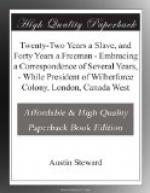* * * * *
Thus ended our first public celebration of our own and our country’s freedom. All conducted themselves with the strictest propriety and decorum, retiring to their homes soberly and in proper season.
CHAPTER XVIII.
CONDITION OF FREE COLORED PEOPLE.
Pursuant to a call given in the summer of 1830, by the colored residents of Philadelphia, for a National Convention of their race, I started in company with a friend to attend it; having previously engaged seats inside Mr. Coe’s stage-coach as far as Utica, N.Y., to which place we had paid our fare the same as other passengers.
We rode on to Auburn very pleasantly, but when at that place, we with others moved to resume our seats; we were met by a stern rebuke for presuming to seat ourselves on the inside, and were ordered to ride on the outside of the coach. In vain we expostulated; in vain we reminded the driver of the agreement, and of our having paid for an inside seat; we were told to take the outside of the coach or remain behind.
Desiring to attend the convention, we concluded to go on, submitting to this rank injustice and dishonesty, until our return, when we determined to sue the proprietor of that line of stages. An opportunity was offered soon after, when I commenced a suit for damages against Mr. Sherwood, who was the great stage proprietor of those days. He, however, cleared himself by declaring that he was in no way responsible for the failures of Mr. Coe, to whom I must look for remuneration. I never found it convenient to sue Mr. Coe, and so the matter ended.
We passed through New York City to the place of our destination, where we found many of our brethren already assembled.
Philadelphia, which I now saw for the first time, I thought the most beautiful and regularly laid out city I ever beheld. Here had lived the peaceable, just, and merciful William Penn; and here many of his adherents still reside. Here, too, was the place where the Rt. Rev. Bishop Allen, the first colored American bishop in the United States, had labored so successfully. When the Methodists sought to crush by cruel prejudice the poor African, he stepped boldly forward in defence of their cause, which he sustained, with a zeal and talent ever to be revered.
Thousands were brought to a knowledge of the truth, and induced “to seek first the kingdom of heaven and its righteousness,” through his instrumentality. Through the benign influence of this good man, friends and means were raised for his poor brethren, to build houses of worship, where they would no more be dragged from their knees when in prayer, and told to seat themselves by the door. Oh, how much good can one good and faithful man do, when devoted to the cause of humanity—following in the footsteps of the blessed Christ; doing unto others as they would be done by; and remembering those in bonds as bound with them. What though his skin be black as ebony, if the heart of a brother beats in his bosom? Oh, that man could judge of character as does our Heavenly Father; then would he judge righteous judgment, and cease to look haughtily down upon his afflicted fellow, because “his skin is colored not like his own.”




